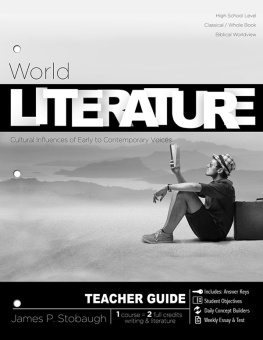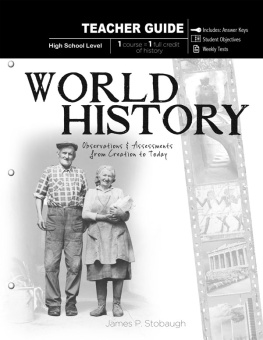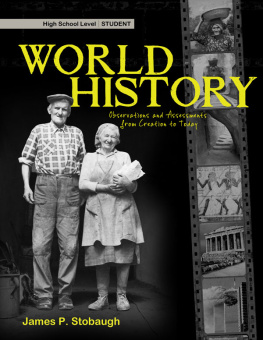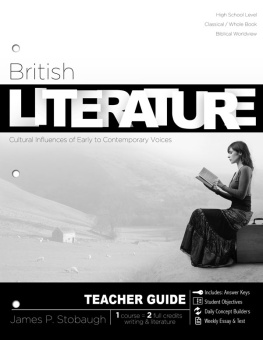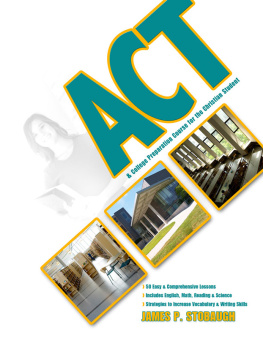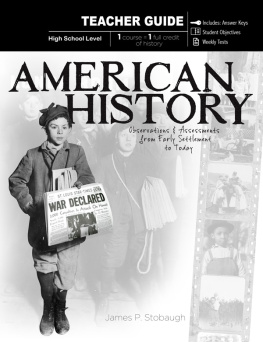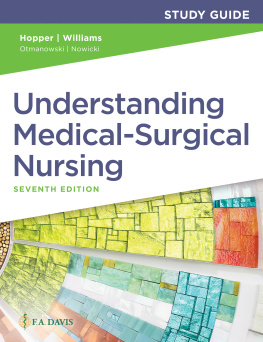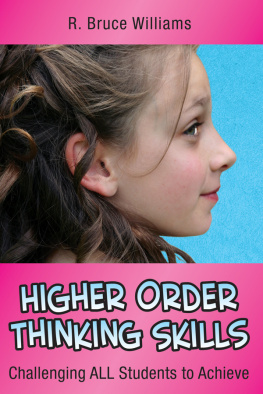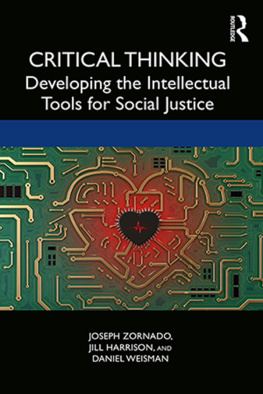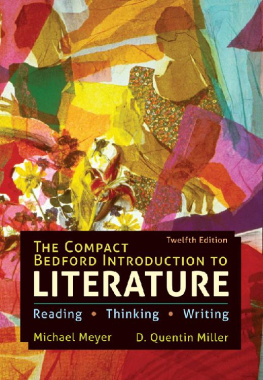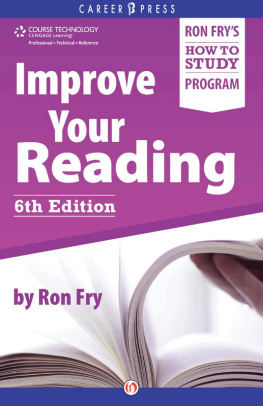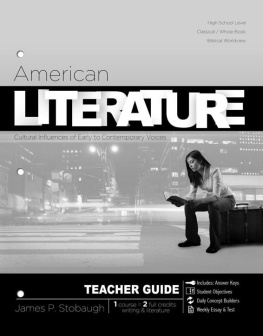First printing: November 2012
Copyright 2012 by James P. Stobaugh. All rights reserved. No part of this book may be used or reproduced in any manner whatsoever without written permission of the publisher, except in the case of brief quotations in articles and reviews. For information write:
Master Books, P.O. Box 726, Green Forest, AR 72638
Master Books is a division of the New Leaf Publishing Group, Inc.
ISBN: 978-0-89051-676-8
ISBN: 978-1-61458-271-7 (ebook)
Cover design by Diana Bogardus.
Interior design by Terry White.
Unless otherwise noted, all images are from shutterstock.com, Library of Congress (LOC-image), and Wikimedia Commons. All images used under the Creative Commons Attribution-Share Alike 3.0 Unported license (CC-BY-SA-3.0) are noted; license details available at creativecommons.org/licenses/by-sa/3.0/. Other photos are public domain (PD-US) and (PD-Art).
Scripture quotations taken from The Holy Bible, New International Version, Copyright 1973, 1978, 1984, 2011 by Biblica, Inc.TM Used by permission of Zondervan, All rights reserved worldwide.
Permission is granted for copies of reproducible pages from this text to be made for use within your own homeschooling family activities or for small classrooms of 10 or less students. Material may not be posted online, distributed digitally, or made available as a download. Permission for any other use of the material needs to be made prior to use by email to the publisher at nlp@newleafpress.net
Please consider requesting that a copy of this volume be purchased by your local library system.
Printed in the United States of America
Please visit our website for other great titles:
www.masterbooks.net
For information regarding author interviews, please contact the publicity department at (870) 438-5288
Dedication
This Book is gratefully dedicated to Karen and our four children: Rachel, Jessica, Timothy, and Peter.
He has given us a ministry of reconciliation... (2 Corinthians 5:18).
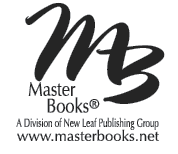
Contents
Reading List : The following is a list of additional books and texts not included within the study that are needed for this course. It is strongly suggested that students read most, if not all these titles during the summer before taking this course. Most will be available at local libraries or as free downloads at The Online Books Page (onlinebooks.library.upenn.edu/lists.html), Project Gutenberg (www.gutenberg.org/wiki/Main_Page), or Bartleby (www.bartleby.com/).
Augustine, Confessions
Dostoevsky, Crime and Punishment
Goethe, Faust
Homer, The Iliad
Homer, The Odyssey
Paton, Cry, the Beloved Country
Tolstoy, War and Peace
Virgil, The Aeneid
Using Your Teacher Guide
How this course has been developed:
1. Chapters: This course has 34 chapters (representing 34 weeks of study) to earn two full credits; writing and literature.
2. Lessons: Each chapter has five lessons, taking approximately 45 to 60 minutes each.
3. Student responsibility: Responsibility to complete this course is on the student. Students must read ahead in order to stay on schedule with the readings. Independence is strongly encouraged in this course, which was designed for the student to practice independent learning.
4. Grading: Depending on the grading option chosen, the parent/educator will grade the daily concept builders, and the weekly tests and essays. (See pages 7 and 8.)
5. Additional books and texts: A list of outside reading is provided after the table of contents. Students should try and read ahead whenever possible. Most readings are available free online or at a local library.
Throughout this book you will find the following:
1. Chapter Learning Objectives: Always read the First Thoughts and Chapter Learning Objectives in order to comprehend the scope of the material to be covered in a particular week.
2. Daily warm-ups: You should write or give oral responses for the daily warm-ups to your educator/parent. These are not necessarily meant to be evaluated, but should stimulate discussion.
3. Concept builders: You should complete a daily concept builder. These activities take 15 minutes or less and emphasize a particular concept that is vital to that particular chapter topic. These will relate to a subject covered in the chapter, though not necessarily in that days lesson.
4. Assigned readings: Remember to read ahead on the required literary material for this course. Students should plan to read some of the required literature the summer before the course.
5. Weekly essays: You will be writing at least one essay per week, depending on the level of accomplishment you and your parent/educator decide upon. These are available in the teacher guide and online.
6. Weekly tests: These are available in the teacher guide and online.
Earn a bonus credit!
Easily integrate related history curriculum for an additional credit, a combination study done in less than two hours daily! History Connections are shown on the chapter introduction page in order to help a student study these texts consecutively, exploring literature and history in unison. (The American , British , and World History curriculum is also written by James Stobaugh and published by Master Books.)
What the student will need each day:
1. Notepad/computer: for writing assignments.
2. Pen/pencil: for taking notes and for essays.
3. A prayer journal. As often as you can hopefully daily keep a prayer journal.
4. Daily concept builders, weekly essay options, and weekly tests are available in the teacher guide and as free downloads at: nlpg.com/AmericanLitAids
Increasing your vocabulary:
Part of the reason for reading so many challenging literary works is for one to increase his or her functional vocabulary. The best means of increasing vocabulary is through reading a vast amount of classical, well-written literary works. While reading these works, one should harvest as many unknown words as possible, and try to use five new words in each essay written.
Create 3x5 Vocabulary Cards
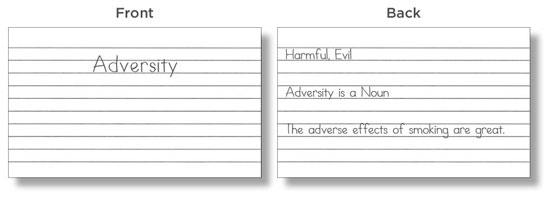
When one meets a strange word for the first time:
- Do your best to figure out the word in context,
- Check your guess by looking in the dictionary,
- Write a sentence with the word in it.
Use the illustration above to formulate vocabulary cards of new words.
Grading Record Options (See chart on following page.)
This course has been developed to allow three grading options for a parent/educator. This allows one the flexibility to adjust the usage of the course content to individual situations and varying requirements. For ease of grading, Option A (essays/exams) and Option B (essays/exams/concept builders [CB]) both provide a total weekly score of 100 points for a course total of 3,400 possible points. Dividing the total score at the end of the course by 34 will provide a percentage grade for the student. You may use the standard system (90-100 = A, 80-89 = B, 70-79 = C, 60-69 = D, below 60 = F), or you may use your own personal grading system. The third grading option simply allows for additional work (warm-ups [WU], additional essays, etc.) to be counted toward each weeks final grade. This can be done at the educators discretion and be added into the overall score of Option A or Option B.

